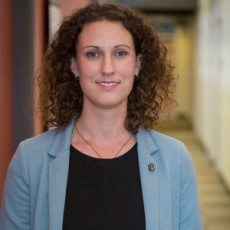Women's History Month, 2017: Deborah Bard, NERSC
March 24, 2017
« Back to Overview |
Leen Alawieh » |
Sowmya Balasubramanian » |
Deborah Bard » |
Tina Declerck » |
Mariam Kiran » |
Lavanya Ramakrishnan » |
Jackie Scoggins » |
Francesca Verdier » |
Deborah Bard, who earned her Ph.D. in particle physics from the University of Edinburgh, is a Big Data Architect at the National Energy Research Scientific Computing Center (NERSC). Before joining NERSC in 2015, she worked as a project scientist on the Large Synoptic Survey Telescope at the SLAC National Accelerator Center and developed and taught a course at Stanford University on "Discovering the Cosmos."
What drew you to working at NERSC?
It's a killer combination of really great, smart, fun people - and massive computational power! I really liked the people I'd interacted with at NERSC when I was at SLAC and I liked the idea of working in a focused team on big problems. Academic research can be quite solitary at times. I was also very attracted to the types of problems NERSC deals with - in particular how to leverage cutting-edge computing architectures for science.
What are some of the challenges you have faced being a woman in what has traditionally been a male-dominated field?
I've always worked in very supportive environments, which I realize is not the case for all women or members of other under-represented groups. The main issue I have is with micro-aggressions; for example, when I meet new people in this field it's often assumed that I'm more junior or inexperienced than I am because people aren't used to seeing women in more senior positions.
What lessons have you learned along the way that you would share with other women thinking about working in this field, or in a science/technology/engineering position in general?
This is advice that applies to everyone: be aware of potential causes of unconscious bias and institutional bias. If you're aware of how this can impact you, then you're in a good position to push back when you notice it might be in play (whether directed at you or others).
More generally, I think getting some hands-on experience is really important when you're deciding whether STEM is a career for you. Even if it's a small, fun coding project you do at home or a science club project at school, it will help you decide if you enjoy the kind of problem-solving that's a huge part of everyday work in STEM. It's important to give yourself a chance to try it out - especially if feel you're being discouraged in any way by other people. I'm a big supporter of NERSC’s intern program, and I think that's a really great way to recruit people from under-represented groups to the lab.
What are some of your proudest achievements?
I'm proud of the way we introduced the Burst Buffer, a layer of flash storage that sits inside Cori, NERSC's newest supercomputer. Flash storage has been used for years in laptops, cellphones and other electronic devices, but it's a new technology for supercomputing and we're still learning how to use it effectively. We worked with scientists who wanted to use the Burst Buffer and with the Cray DataWarp team to develop the functionality of the Burst Buffer to match the needs of the scientists. It was a very effective collaboration, and we can now offer very fast flash storage to our users.
What is your favorite thing about working at NERSC?
The people! We have a very smart, very motivated team at NERSC. We relish the hard problems and we work well together.
About Computing Sciences at Berkeley Lab
High performance computing plays a critical role in scientific discovery. Researchers increasingly rely on advances in computer science, mathematics, computational science, data science, and large-scale computing and networking to increase our understanding of ourselves, our planet, and our universe. Berkeley Lab’s Computing Sciences Area researches, develops, and deploys new foundations, tools, and technologies to meet these needs and to advance research across a broad range of scientific disciplines.







 Instagram
Instagram YouTube
YouTube